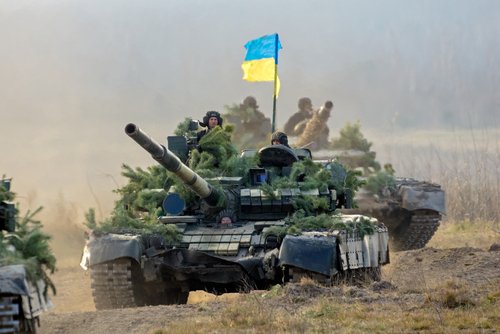Belgium (Brussels Morning Newspaper), Ukraine’s David may not have felled the Russian Goliath, but so far he’s stopped him in his tracks. The significance of how Ukraine unexpectedly stalemated Russia’s invasion should dominate Europeans’ increasingly frenzied defense debate, although the signs are that it hasn’t.
The arguments and recriminations between EU governments are mostly about the size of their defense budgets. The focus should be less on how much to spend and more on where to spend it.
The war in Ukraine is one of contradictions. Dazzling technological innovations contrast with muddy trench warfare reminiscent of 1914-18 and battles between tanks that had long been dismissed as outdated. It’s a throwback war that is also a testing ground for the future.
But while pondering their options, they risk drawing the wrong conclusions. Ukrainian David has been fighting a ‘smart’ war, and Russian Goliath only recovered his balance by following suit.
The ‘fourth industrial revolution’ is still gathering pace as it transforms our lives, and its most dramatic impact may be on warfare. Drones are not only revolutionizing the command and control of infantry troops but also of naval warfare. Russia has lost 25 warships – a third of its Black Sea fleet – to unmanned devices.
Ukraine’s grain exports, an economic lifeline, have resumed and Russia’s air supremacy has also been badly dented by drones.
What lessons are there for Europe?
The “military-industrial complex” that US President Dwight Eisenhower once complained of is still a force to be reckoned with, but it’s far from an unalloyed strength. Despite breakthroughs in AI (artificial intelligence), the big EU defense companies’ answer to the Russian threat is to press ahead with hugely expensive aerospace and naval projects that would mop up the lion’s share of enlarged defense budgets.
The immediate challenge for Europeans is to beef up their budgets as four-fifths of NATO’s defense spending is by non-EU members. That doesn’t mean, though, that the extra money should be funneled into the aerospace sector’s unaffordable white elephants.
Those costs haven’t slackened, and the outlay for getting Lockheed’s new F-35 stealth fighter into service is reckoned at $1.7 trillion. Development costs in Europe are no different.
The need to update aging combat aircraft is plain, and EU governments are understandably reluctant to become over-reliant on US weapons systems. But the tangle of interlocking corporate partnerships and national rivalries in Europe’s aviation sector has not only led to decades of development delays but also risks leaching support away from innovative technologies. If successful, some of these could consign significant areas of current military thinking to the history books.
So where should Europeans be spending more? The answer is clearly on advanced technologies with defense applications, yet most EU governments seem to ignore this. The EU’s European Defence Fund has a niggardly €1 billion a year to co-finance collaborative projects and is paralleled by a similarly modest €1 billion NATO-backed private sector fund for defense start-ups in AI, space, and biotechnologies.
These small steps are in the right direction, but the EU’s earlier Defence Industrial Development Programme shows how little funding ever reaches smaller and more innovative companies. Of 40 participants, just five ‘national champions’ have taken half the projects and three-quarters of the cash.
A major drive on electronic warfare technologies could make up some of the ground lost to the post-Cold War ‘peace dividend’. Communications and information have been key factors in the Ukraine war, yet governments have been cutting back on EU efforts to boost research and so reduce reliance on the US for them.
Now that Russian assertiveness has become aggression, Europeans must re-think their long-neglected defense and security arrangements. The role of the EU, and its executive body the European Commission, will be central to this and will be the focus of the second part of this article.
Opinions expressed in the op-ed section are solely those of the individual author and do not represent the official stance of our newspaper. We believe in providing a platform for a wide range of voices and perspectives, even those that may challenge or differ from our own. As always, we remain committed to providing our readers with high-quality, fair, and balanced journalism. Thank you for your continued support.Sincerely, The Brussels Morning Team




